

Inquiry and Information Fluency Mini-Lesson 2. Inquiry and Information Fluency Mini-Lesson 3. American Memory from the Library of Congress - Browse Collections. Digital Public Library of America. Diana Laufenberg: How to learn? From mistakes. Tagxedo - Word Cloud with Styles. Tagul - Word Cloud Art. Introduction. 1.

Students learn isolated skills and knowledge, starting with the simple building blocks of a particular topic and then building to more complex ideas. While this appeals to common sense (think of the efficiency of a automobile assembly line), the problem with this approach is the removal of any context to the learning, making deep understanding of the content less likely. Perkins calls this approach elementitis, where learning is structured exclusively around disconnected skills and fragmented pieces of information. 2. Students learn about a particular topic. Creating Classrooms We Need: 8 Ways Into Inquiry Learning. If kids can access information from sources other than school, and if school is no longer the only place where information lives, what, then happens to the role of this institution?
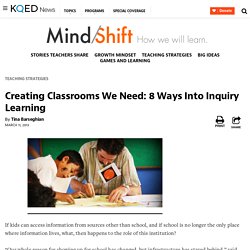
“Our whole reason for showing up for school has changed, but infrastructure has stayed behind,” said Diana Laufenberg, who taught history at the progressive public school Science Leadership Academy for many years. Laufenberg provided some insight into how she guided students to find their own learning paths at school, and enumerated some of these ideas at SXSWEdu last week. 1. BE FLEXIBLE. The less educators try to control what kids learn, the more students’ voices will be heard and, eventually, their ability to drive their own learning.
Laufenberg recalled a group of tenacious students who continued to ask permission to focus their video project on the subject of drugs, despite her repeated objections. Research and Information Fluency. It has been four years since I went to ISTE and the excitement was overwhelming knowing that I would be able to reconnect and meet for the first time colleagues from around the world.
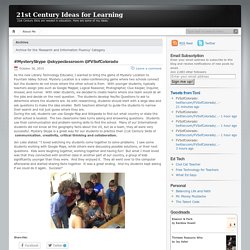
The morning started at 2:15 am so that I could meet my district co-workers at 3:30 to drive to our 6:15 flight from Denver We were all innovative teachers, some of us had been to ISTE and some of us connected with Twitter. We discussed the ISTE networking game as we made our route from Colorado Springs to Atlanta. After we landed, I was so anxious to make it to he Global Education Day that ran to my room then to the bus shuttle to get to the conference as soon as possible.
At the bus stop I ran into none other than Anne Mirtschin from Australia. She was in a rush to get into the Global Education Day. On Sunday we started early, I viewed many Poster sessions, including Flipping the Library, Kentucky Student Technology Leadership Program (KSTL), Let’s make a change, and many others (some resources below). Sugata Mitra: The child-driven education. Research Skills Checklist. The 5e's of Instruction: More Ideas for Researching with Students - Tech With Jen. Ok, I admit it I am terrible at writing blog posts consistently.
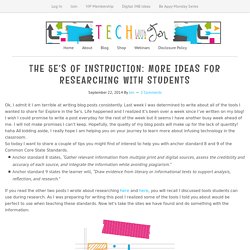
Last week I was determined to write about all of the tools I wanted to share for Explore in the 5e’s. Life happened and I realized it’s been over a week since I’ve written on my blog! I wish I could promise to write a post everyday for the rest of the week but it seems I have another busy week ahead of me. I will not make promises I can’t keep. Hopefully, the quality of my blog posts will make up for the lack of quantity! So today I want to share a couple of tips you might find of interest to help you with anchor standard 8 and 9 of the Common Core State Standards.
Anchor standard 8 states, “Gather relevant information from multiple print and digital sources, assess the credibility and accuracy of each source, and integrate the information while avoiding plagiarism.” Online Plagiarism: What it Is, and What the Con... Why “Googling It” Is Not Enough. Thinkstock Has the Internet changed the way students conduct research?
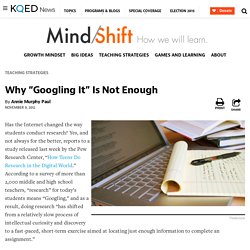
Yes, and not always for the better, reports to a study released last week by the Pew Research Center, “How Teens Do Research in the Digital World.” Taking Risks for 21st Century Research Skills. How Shared Research Can Inspire Your Students. Organizing shared research projects can be a daunting endeavor for teachers.
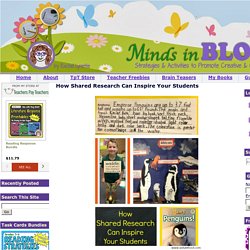
The purpose of shared research is to engage students in rigorous, complex text while promoting discussion and collaboration. Presenting informational text within a unit of study helps students explore topics in depth as well as strengthens understanding. "How To Do Research" Game. How the ‘Big6’ can aid in Common Core implementation. With implementation of the Common Core State Standards under way, a method known as the Big6 can help ensure that a curriculum put in place to meet the standards is rich in information, problem-solving, and decision-making, its creators say.
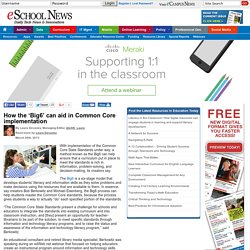
The Big6 is a six-stage model that develops students’ literacy and information skills as they solve problems and make decisions using the resources that are available to them. In essence, say creators Bob Berkowitz and Michael Eisenberg, the Big6 process can help students master the Common Core standards, because the process gives students a way to actually “do” each specified portion of the standards.
An educational consultant and retired library media specialist, Berkowitz was speaking during an edWeb.net webinar that focused on helping educators create an instructional program around information and technology skills. Information Fluency. Determining Website Credibility. Get Literacy Resources. Study finds that high-poverty schools with a certified teacher librarian achieve a 5-year graduation rate of 79% « Library Research Service. Image credit: Washington Library Media Association There’s yet more reason to invest in school library programs!
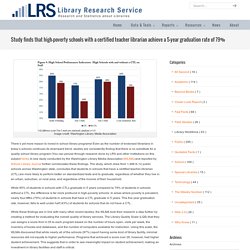
Even as the number of endorsed librarians in today’s schools continues its downward trend, studies are consistently finding that there is no substitute for a quality school library program (You can peruse through research done by LRS and other institutions on this subject here). A new study conducted by the Washington Library Media Association (WLMA) and reported by School Library Journal further corroborates these findings. The study, which drew from 1,486 K-12 public schools across Washington state, concludes that students in schools that have a certified teacher-librarian (CTL) are more likely to perform better on standardized tests and to graduate, regardless of whether they live in an urban, suburban, or rural area, and regardless of the income of their household.
Information Fluency to the Rescue. Try to imagine life before the Internet (yeah, it’s hard!)
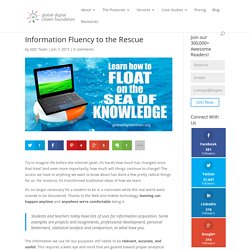
How much has changed since that time? And even more importantly, how much will things continue to change? The access we have to anything we want to know about has done a few pretty radical things for us. For instance, it’s transformed traditional ideas of how we learn. Does ethical content curation exist? A data-driven answer. Ever since we started to work on Scoop.it, we’ve had this question: is it fair to use other people’s content for your own good: in other words, how ethical is content curation?
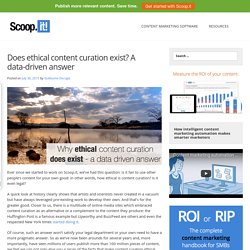
Is it even legal? A quick look at history clearly shows that artists and scientists never created in a vacuum but have always leveraged pre-existing work to develop their own. The Keyword Blog: Information Fluency Interacti... Helping Students Become Better Online Researchers. Your students are probably Internet authorities. When it comes to Instagram, Twitter, and YouTube, they might know far more than you. All of that time spent tweeting and chatting doesn’t necessarily translate to deep learning though. As students progress through school, online research skills become more important — for good reason. Both college professors and employers will expect young people to know their way around the academic side of the Internet; a skill that for many students, needs to be taught. In a Pew survey, a majority of teachers said that their students lacked patience and determination when doing difficult research. Image via Flickr by Brad Flickinger.
@RightQuestion Digest 10/1/2015. Digital fluency; Students Learning in the Digital World. Defining digital fluency? Today, computer games, email, the internet, mobile phones and social media, are all important parts of our lives. Digital fluency has to do with our ability to achieve a desired outcome in a situation using the technologies that are available to us. It is not until that person reaches a level of fluency, that they are comfortable with when to use the tools to achieve the desired outcome, or if they are likely to have the desired outcome at all.
Building skills to participate in the digital world? The term digital world defines, the way in which technologies support and influence the world in which we live. most would agree,the more confident and fluent a person is, the better they are able to predict learning outcomes. How teachers develop digital fluency students? Rethinking Learning in the Age of Digital Fluency. KarenMelhuishSpencer (@virtuallykaren) Powerful Learning: Studies Show Deep Understanding Derives from Collaborative Methods. Today's students will enter a job market that values skills and abilities far different from the traditional workplace talents that so ably served their parents and grandparents. They must be able to crisply collect, synthesize, and analyze information, then conduct targeted research and work with others to employ that newfound knowledge. In essence, students must learn how to learn, while responding to endlessly changing technologies and social, economic, and global conditions.
But what types of teaching and learning will develop these skills? Virtualschoollibrary / Personal Learning Environments. Building Your Personal Learning Network (PLN) What is a Personal Learning Network? In the 21st century, it's a set of tools that you can use to keep up with current trends, debate, discussions, ideas, resources, and pretty much anything else you can think of! A PLN is one-stop shopping for all of the resources you want to use to keep yourself current and connected. Information Fluency. Savannah Baker (@savybaker824) Project-based Learning: What It Is, and How It Benefits Students. As a foreign language teacher, I need to assess my students in a variety of ways on a regular basis. As we all know, not every person learns the same way or has the same interests. In terms of assessment, some students can learn the material really well, but when a traditional test is given, their information and knowledge somehow disappears.
Great Teaching Means Letting Go. Great Teaching Means Letting Go by Grant Wiggins, Ed.D, Authentic Education My greatest learning as a teacher came on the soccer field. Chris Lehmann - Inquiry: The Very First Step In the Process of Learning. Chris Lehmann is the founding principal of the Science Leadership Academy (SLA) in Philadelphia, Pennsylvania. Tutorials. Georgia’s Virtual Library...bringing quality content to you! Even better search results: Getting to know Google search for education. Google Image Search will let you use an actual picture as your search parameter, how cool is that? Eli Pariser: Beware online "filter bubbles".
Pro Tips for Searching Google Effectively in 2013. Basic Search Education Lesson Plans - GoogleWebSearchEducation. Web search can be a remarkable research tool for students - and we've heard from educators that they could use some help to teach better search skills in their classroom. Creating Classrooms We Need: 8 Ways Into Inquiry Learning. My daily info-wrangling routine. Jane Hart describes her daily personal knowledge management (or PKM) routine. How Information Travels Wirelessly.